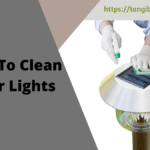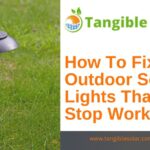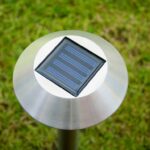How to Clean Solar Panels on Garden Lights?-Tangible Solar
Solar garden lights are quite popular these days. How to clean solar panels on garden lights It is because, in addition to giving light at night, they are also an ecologically responsible method of adorning your house.
Solar garden lights use microscopic solar panels to charge their batteries, so they can run all night instead of drawing power from your home’s electrical system. However, in order to reap all of its advantages, you must first understand how to properly clean solar panels for garden lighting.
Although solar outdoor lights are waterproof and durable, they do need some care and maintenance from time to time in order to function properly. The solar panel is one of the most crucial aspects to consider. Solar panels that are clean are more effective at converting light energy into power, so you should keep them clean. Solar Lights For Gate Entrance Reviews
What Is the Best Method for Cleaning Solar Panels?
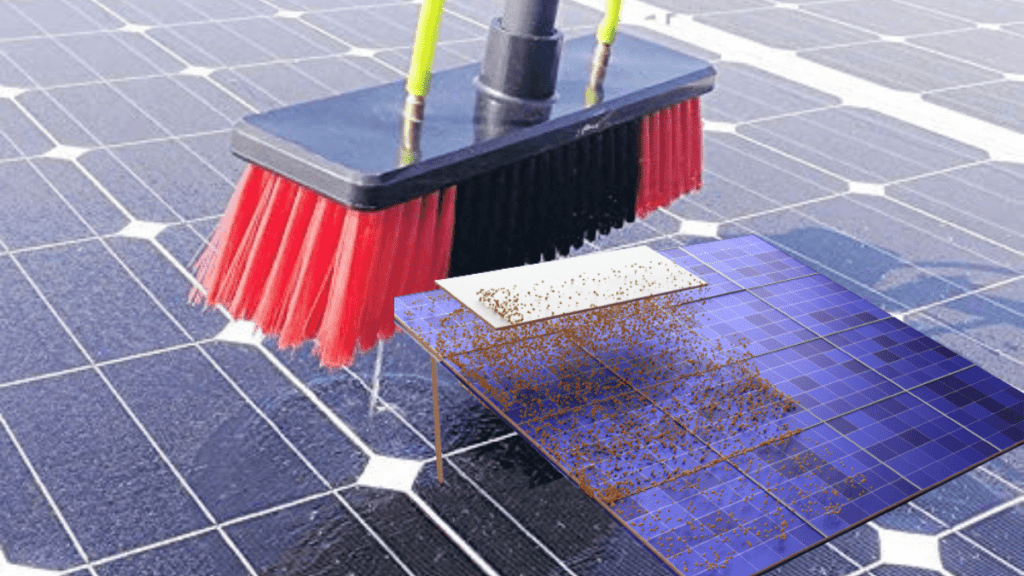
If you have a residential solar energy system installed, your solar panels are normally flat, inclined, and located on your rooftop. When was the last time you had your roof cleaned?
Certainly not very frequently, if ever. What’s the deal with that? “Isn’t that why there’s rain?” I get what you’re saying. This logic also applies to solar panels.
Your solar panels won’t need to be cleaned very frequently, if at all. After all, any dirt or pollen that accumulates on them will be washed away the next time it rains. However, there are times when cleaning your solar panels is necessary.
If your panels have a lot of bird droppings, rain may not be able to wash them away quickly; therefore, cleaning them is a good idea. You may also need to clean them on a regular basis if you reside in a drought-prone area or if the rain is merely light and misty.
Is it true that dirt and debris affect solar panel efficiency? And, if so, how much would it set you back? Yes and no, in a nutshell. And there isn’t much of it.
Yes, dirt and debris may lower the quantity of sunlight that is turned into energy. However, the efficiency loss is minimal, probably 5% or less. And, with a typical 5kW solar system, you may save $20 on your monthly energy bill.
On a monthly basis, no. Even if we’re talking about drought-stricken areas when it rains a few months later, everything will be washed away, and it may not be worth the effort to clean it in the first place. Best Outdoor Solar Lights For Signs
What Would Happen If Your Solar Panels Were Not Cleaned?
Before you learn how to clean your solar panels, you first understand why you need to clean your garden lights’ solar panels.
Knowing why makes you feel more accountable, which makes you want to do it more often without being prompted to. Here are a few examples:
The warranty will be voided.
If you allow your solar panels to get so dusty that they cannot receive enough light to charge the batteries, keep in mind that this is not the manufacturer’s fault.
This is the result of the owner’s carelessness. This implies that you will be unable to use the product’s warranty.
Keeping the solar panels clean, on the other hand, will keep the whole lighting system running well for many years.
This may even imply that you will not need to file a warranty claim at all. This is a fortunate thing since the lighting system is still in fine operating order.
The solar panels will not be able to collect enough sunlight.
When you allow the solar panels to get so dusty that you can trace a line in the dust with your finger, their capabilities are already reduced by half. The solar panels must get direct sunlight in order to replenish the batteries in the lights. It won’t take much dust to effectively block sunlight from reaching the solar panels.
When the solar panels do not get enough sunshine, they are unable to charge the batteries enough. This implies that your lights will switch off after around an hour of operation throughout the night. Give your solar garden lights a quick dusting.
Solar panels that are clean last longer.
Allowing dirt and dust to collect on top of the solar panels will result in significant damage. They will not only scratch the surface of the panels, reducing their effectiveness, but they will also cause the metal components to corrode.
Furthermore, cleaning your solar lights on a regular basis will help you to see if they have any additional issues. Catching problems early makes them simpler to rectify than letting the harm worsen over time.
Is Rainwater Insufficient to Clean Solar Panels?
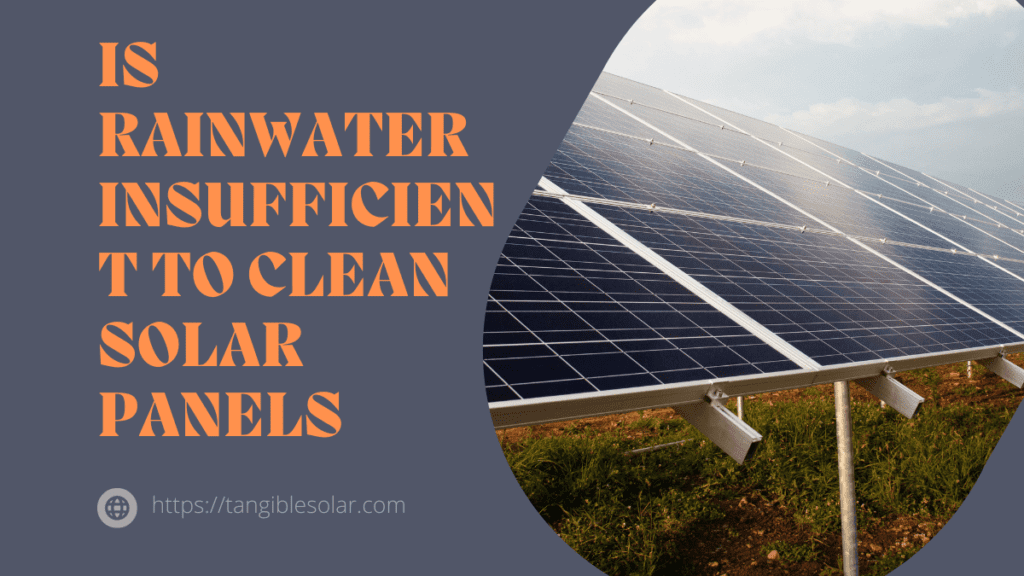
If it rains often in your location, you may believe that this is sufficient to keep your solar panels clean. But keep in mind that this is not the case. For example, automobiles may seem dazzling clean after a heavy rain shower, but after the water has dried up, you will notice that the precipitation has left a lot of filth behind.
Rainwater is polluted. In the raindrops, there are many dirt particles and other items suspended. Rainwater leaves a film of filth and grime behind, which may be far more difficult to remove than typical dirt and dust. This is why, after the rain, you should wipe off your solar panels with a clean towel.
How Do You Clean Your Garden Lights’ Solar Panels?
Before you begin
If you still have your garden lights, you should examine the owner’s handbook or look them up online. Check the handbook for any specific cleaning recommendations for the landscape lights. If there are none, continue with the remainder of the instructions.
What you will need
If your garden lights do not come with cleaning instructions, you may simply clean them with soap and water. If the solar panels’ exterior layer is comprised of tempered glass, you may also use window cleaner.
How do you clean solar panels?
Fill a bucket halfway with warm water and add just enough mild detergent to make a lather. Other cleaning products, such as bleach, should not be used since they can harm the surface.
Using a yard hose, saturate the solar lights. This will get rid of a lot of the loose dust and debris on the panels. It will also loosen caked-on dirt.
Take a sponge from the kitchen. Avoid using scouring pads since they can scratch the surface of the solar panels and reduce their effectiveness. After dipping the sponge in the pail of soapy water, clean the solar panels on the yard lighting.
When you’re through cleaning, turn on the water again and rinse the solar panels. You do not need to bother about drying the solar panels separately. They are not huge enough that you will leave streak imprints on their surfaces.
Things to Keep in Mind
Do not submerge the garden lights in a pail of water. They are more than likely water-resistant but not waterproof.
Do not scrape too vigorously. Scrubbing too hard may scratch the surface of the solar panels. When the surface of the solar panels gets too dull, polish them using a rubbing compound and a clean towel.
When it is chilly outdoors, clean the solar panels.
This will not only make the task simpler for you, but it is also preferable to clean the solar panels while they are not hot. Dousing the heated panels with cold water all at once may cause thermal shock, causing the panels to fracture.
Never use a power washer. Power washers may seem like a fun method to clean your solar lights, but this is not suggested.
The water that comes out of the nozzle of a power washer is so powerful that it may cause the solar panels to shatter.
Furthermore, the pressured water will be able to enter your garden lights, causing them to short out.
How Often Should You Clean Your Garden Lights’ Solar Panels?
How to clean solar panels on garden lights. It is important to understand how often you should clean the solar panels on your garden lighting. The frequency with which you clean will be determined by the weather in your area. If you reside in a semi-arid climate, the solar panels should be cleaned every six months or so. The same holds true if you reside in a tropical environment.
If, on the other hand, you live in an area that is mostly dry and dusty, you should water off the solar panels whenever possible to prevent dust accumulation and wash them every 3 to 4 months.
For example, if you reside in the Southwest, such as Arizona or Texas, you should wash them more regularly. This is also true if you live near a motorway. Aside from clearing dust and grime, you should also keep an eye out for falling leaves and other debris from your yard’s plants and trees.
Check your solar lights to see whether they have been covered in dry, fallen leaves as autumn approaches. If they are, use a leaf blower or rake to remove the leaves. You’ll also know it’s time to clean your solar garden lights if you observe them flickering or going off sooner than usual throughout the night.
This indicates that the solar panels are not properly charging the batteries of the lights throughout the day, and the problem is often a filthy solar panel.
What are you using to clean your solar panels?
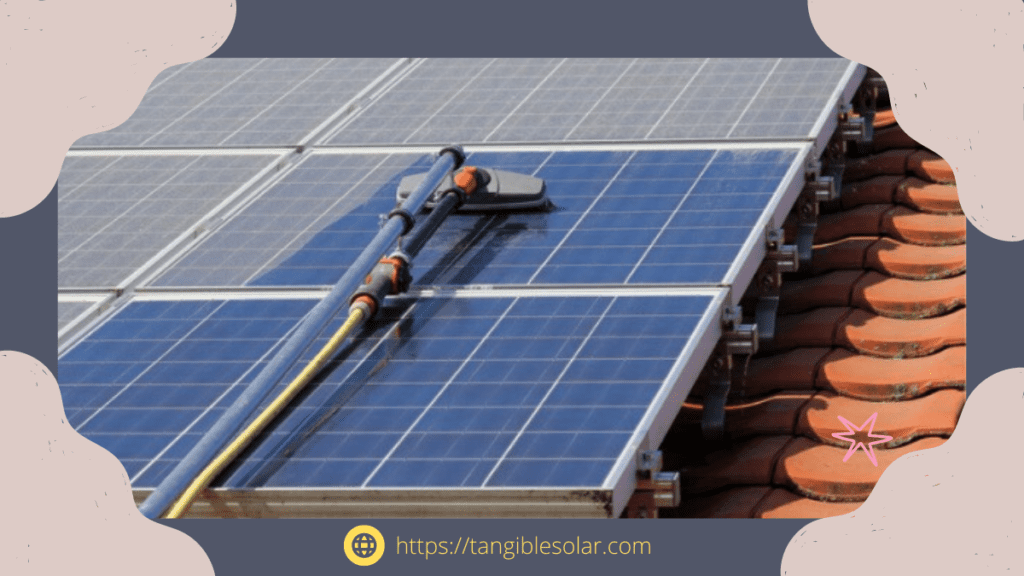
If you want to do it yourself, you may clean your home solar panels using a variety of materials. But first and foremost, let’s go through the basics. Check with your solar installers and suppliers to see if they have any solar panel cleaning advice, dos, and don’ts for cleaning your system.
The most effective technique is to clean your solar panels using a hose and a pail of soapy water. In the same manner that you would wash your car at home.
Because you don’t want to scratch the panels, apply it using soapy water and a non-abrasive sponge. When cleaning your solar panels, remember to avoid using any kind of high-pressure water sprayer. A high-pressure attachment might harm the solar panel itself.
If you must use anything other than water to remove pesky bird droppings, make sure it is soft and devoid of bristles. Because they do not harm solar panels, sponges are ideal for cleaning them. If you wish to put soap on your sponge, use whatever you normally use to clean your dishes.
Laundry detergents and other harsh chemicals may be harmful to your solar panels. Remember that in 99.9% of cases, plain water is the best solution.
Keep in mind that solar panels may grow quite hot when exposed to direct sunlight. It’s best to clean the panels on a cool, cloudy day.
Not only should you avoid being scorched, but if you clean the solar panels while it’s really hot outdoors, the soapy water you use will evaporate quickly, leaving a residue or smear on the panels that will lower their efficiency.
Is It Necessary to Clean Your Solar Panels?
Based on the evidence, experts are leaning toward “no.” Especially if you want to hire a professional cleaning service instead of doing it yourself. Simply put, the return on investment is inadequate to warrant the effort. Let’s take a look at some numbers.
When your solar panels get filthy, expect a 5% or less loss in production. That is only true when they are unclean. If the solar panels have dust or debris on them and their energy production is 5% lower than it is at other times, the next rain will wash the junk away and the solar panels will return to their optimal efficiency. Even if you live in a drought-prone area, it will rain again.
Furthermore, most solar panels are slanted such that most accumulation flows off the panel rather than clinging to the top. Even with slanted panels, there may be some accumulation on the bottom panel (due to runoff accumulating at the bottom), but the output drop is so minimal that it’s not worth worrying about.
Finally, ascending a ladder, going on your roof, and cleaning your own solar panels is a negligible energy and cost tradeoffs. When you imagine stepping out there and dragging a hose up to the roof to clean them, this concern may begin to sink in.
Upkeep and maintenance
Allow the rain to clean your solar panels in general. Keep track of your system’s functioning by paying attention to your energy bills and use them month after month.
If your power bill starts to vary, it’s important to think about cleaning or other sorts of maintenance. Whether you believe that fluctuations in your energy costs are the result of solar panel cleaning, wait for a good rain to see if efficiency returns to normal.
If this is the case, you’re probably finished. If the functioning remains faulty, it is probable that something electrical has to be repaired rather than just cleaned.
When it comes to solar panel cleaning, a visual inspection, a rainwater bath, and remaining on the ground (rather than climbing a ladder) may be all that the solar doctor requires.
Can Vinegar Be Used to Clean Solar Panels?
Some of the best products?
How to Clean Solar Panels on Garden Lights Consider using vinegar to clean your solar panels in an environmentally friendly and sustainable manner.
We’ve all heard that vinegar may be used as a general cleaner. It’s also simple to locate in your pantry. Though vinegar may seem to be ineffective, it is a fantastic ingredient for keeping metal and crystal antiques as clean as new.
To create a cleaning solution, dilute it somewhat. In a mixing dish, combine 1/4 cup vinegar, two cups water, and half a teaspoon of liquid detergent (or any non-abrasive soap). Fill a spray bottle with this and you’ve got yourself a solar panel cleaning solution. It’s as easy as that!
The vinegar helps to remove tougher stains that may be difficult to remove from the panels.
How Can You Make Foggy Plastic Clear Again?
Soak the plastic object in a small bucket of vinegar for five minutes. If the cloudiness continues, sprinkle the item thoroughly with baking soda before putting it in the vinegar bath. As a consequence, the layer that adheres to the plastic and forms the cloud should dissolve.
Can Nail Polish Remover Be Used To Clean Solar Lights?
Acetone will not affect solar panels (nail polish remover). In reality, nail paint remover may be used to eliminate dirt and debris from cells. After using acetone, your lights may get discolored or blurry, so wipe them off with a soft cloth.
How Do You Restart Your Solar Lights?
Some of the reasons why solar lights may not work are as follows.
- The toggle that toggles things on and off.
- The pull tab on the battery.
- Check that the sensor is operational.
- Ascertain that the solar panel is in functioning condition.
- Solar light does not get direct sunlight.
- These are rechargeable batteries.
How Can I Make My Solar Lights Shine Brighter?
The solar panel is an essential component of solar illumination. It is composed of cells that collect solar energy and then convert it to battery electricity. To be effective, solar light must be exposed to as much sunlight as possible throughout the day.
Over time, dust, garbage, snow, or other material may accumulate on the surface of the panel (particularly if your solar lights aren’t inclined), preventing sunlight from reaching the photovoltaic cells. There can only be one conclusion: it is time to clean them.
- Remove any lights that are too high up to make access to the solar panel simpler. Solar lights may be left in the ground or on the ground, depending on whether they are in-ground or on-ground.
- With a brush, remove any more rubbish or debris that has accumulated on top of the solar panel.
- Scrub the solar panel’s surface gently with a damp cloth and a mild detergent (such as dish soap).
- Once the solar panel is clean, use a clean towel to remove any excess water and detergent, leaving the solar panel shining.
- Put the solar illumination back where it belongs.
Your lights may dim if the light panel gets dirty. The light panel is often made of plastic or glass and acts as a weatherproof cover for the light. Using the same procedures as previously, ensure that this protective panel is also clean.
Why Do Outdoor Solar Lights Fail?
Because solar lights depend on sunlight for electricity, they will not work if there is not enough sunlight. As a consequence, make sure your solar light is placed or positioned in a location where it will get enough sunlight to charge its battery and perform properly. You may also experiment with tilting the solar panel to get more sunlight.
Is it possible for me to clean my own solar panels?
Depending on the extent of the debris, you may not need to do much to clean your panels. This is why we advise you to first analyze the panels. Examine the panels to check how much garbage, filth, and material buildup has gathered (are there any sticky substances, such as bird droppings)
Can I Use A Hose To Reduce Dust Buildup?
If the messiness of your panel is mostly due to dust and dirt buildup, a simple hose-down should suffice. If your garden hose can reach the panels, that should be plenty. Simply soak them in water and you’re good to go.
Just make sure you don’t spray the panels with high-pressure jets or a pressure washer. This may cause the panels to scrape or be damaged, resulting in lower performance and efficiency.
Scrub Them Down for a More Extensive Mess?
If the debris on your panels is more than just dust and grime and contains sticky items such as bird droppings or sticky plant components, you should thoroughly clean them.
You don’t want to offend the panels again. To prevent scratching or harming the panels, use a mild scrubber, squeegee, or brush. Choose a soft soap that does not include any chemicals that might harm or destroy the panels.
After that, wipe the panels as follows:
- Half-fill a bucket with warm water and a pinch of mild soap.
- Rinse solar panels using a hose or a similar low-pressure sprayer.
- To remove any dirt or buildup, gently brush the panels with soapy water and the scrubber.
- Rinse the solar panels well to remove any soapy water.
- Allow the panels to dry naturally.
And there you have it; it’s a rather easy technique that takes just a scrubber capable of reaching across your panels. Keep in mind, however, that solar panels get exceedingly hot on hot summer days. You may like to clean first thing in the morning or last thing at night.
Another possibility is to get them serviced.
If you don’t want to handle the task yourself, you may contact a professional to service the panels. If you purchased your solar panels directly from the manufacturer, check their website to see if there are any service providers in your region.
Many companies provide service plans with the purchase of the panel. These programs may involve regular maintenance and upkeep (depending on the supplier). Routine checks might also be included to ensure that the panels are running as effectively as possible. Camping Solar Panels
We, on the other hand, would not choose this option if we had the choice. These services may prove to be rather pricey. You’re essentially paying money to save money on your power bill later on.
You’re completely destroying your own cost-cutting initiatives! And, while cleaning solar panels isn’t a tough task in and of itself, we wouldn’t recommend paying someone to do it in most circumstances.
Remember that you are merely comparing the cost of maintaining the panels with the cost of producing more energy with cleaner panels. These costs will virtually never be recouped.
Is it required that I clean my solar panels?
Sometimes, cleaning your solar panels is easy. Rain, in fact, does an excellent job of cleaning your solar panels. Otherwise, during seasons of severe dust or other local weather issues, you may need to clean your solar panels to eliminate dust and debris.
Here are some pointers to help you clean your solar panels yourself:
- Do not climb onto your roof and shower your solar panels with a hose from the ground.
- Cleaning agents that are mild on the panels should be used.
- If you clean your solar panels during the hottest part of the day, the substantial temperature differential between the water and the solar panels may cause the glass to shatter.
Regularly prune any trees near your solar system to guarantee that sunlight reaches your panels. The study conducted at your house during the pre-installation site visit produced a baseline for tree shadowing, which you must maintain throughout the life of your solar energy plan.
Solar panels will grow dirty over time. Rainfall is generally an efficient and consistent method of cleaning the panels. However, in more arid areas where water is rare and dust storms are prevalent, it may be necessary to regularly clean your solar panels. Instead of using strong chemicals that might destroy the panels, use a garden hose.
The majority of maintenance issues are caused by the solar system’s wiring, rather than damaged panels or equipment. To prevent problems with your home solar system, inspect the solar panels for any accumulation of leaves, trash, snow, or vermin (such as squirrels or rats). 2
How to Clean Solar Panels on Garden Lights FAQs?
Do the solar panels on the garden lights need to be cleaned?
The quantity of charge received and, consequently, the performance of the light might be adversely affected by anything that prevents the panel from receiving sunlight. It is crucial to routinely clean the panel because debris like dust and dirt can be one such obstruction.
How is the solar panel on solar lights cleaned?
Ideally, you should clean your solar outdoor lights with soapy water and a soft cloth. To get rid of tough dirt and muck, you might need a soft-bristled brush. It is advised to clean your solar panels either early in the morning or late at night to avoid cleaning them while the fixtures are hot.
What substances are suitable for cleaning solar panels?
Here is a straightforward, non-toxic formula for glass cleaner: In a spray bottle, combine 2 cups of water, 1/4 cup liquid non-abrasive soap, and 1/2 teaspoon of vinegar in a spray bottle. The solar panels may be cleaned reasonably well with an air hose in dry places where water is scarce.
How long do solar lights last outside?
Batteries for outdoor solar lights typically last 3 to 4 years before needing to be replaced. The lifespan of the LEDs is ten years or more. You know it’s time to change the parts when the lights can no longer maintain a charge to illuminate the area at night.
What can I make with my old solar garden lights?
If any LED light bulbs are present in your solar fixtures, you can get rid of them by putting them in your trash bin for curbside pickup in a plastic bag. Although some places have recycling programs, it might be challenging to locate facilities specifically designed to recycle LED bulbs.
Do my solar panels need to be cleaned?
Although cleaning solar panels is not necessary, doing so will reduce their efficiency. Additionally, while rain will undoubtedly wash away some of the materials that build up on the panels, it won’t be as efficient as human cleaning.
Conclusion
How to clean solar panels on garden lights. Although solar lights need little maintenance, they will benefit from regular cleaning and upkeep. If you want your solar garden lights to survive for a long time, you must clean their most crucial component, the solar panel. Cleaning them, thankfully, is not difficult and does not require the use of any special instruments.
It’s a good thing you don’t have to conduct major cleaning all the time. Once a year is plenty. Of course, this is dependent on where you reside and the typical weather conditions.
Remember that if you want your solar lights to offer you wonderful lighting every night for many years, you must clean them, particularly their solar panels, on a regular basis. This is why you must acquire as much information as possible on how to clean solar panels on garden lights before putting it into practice.

